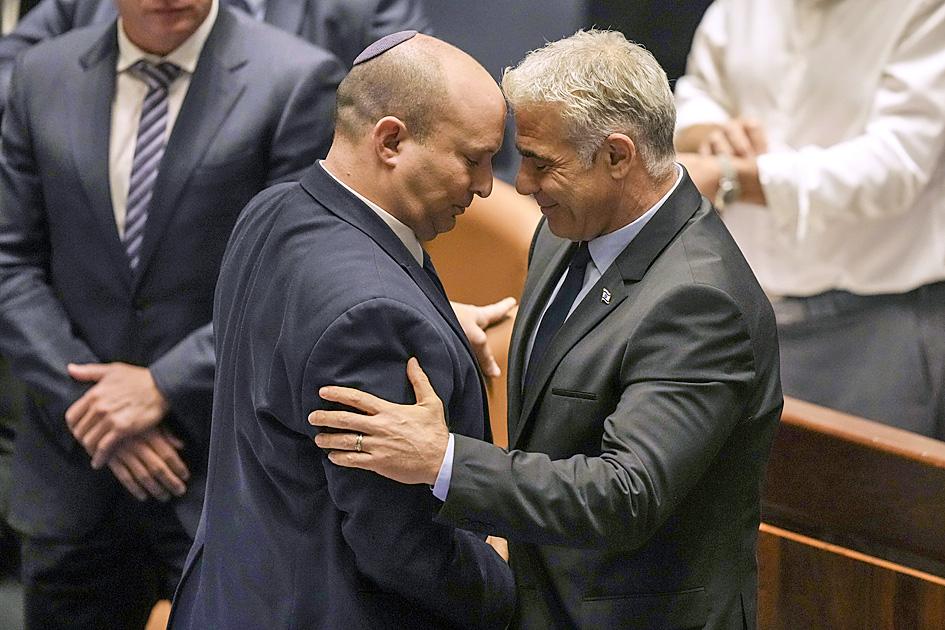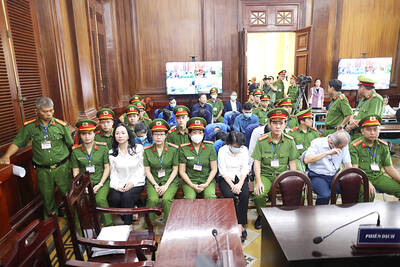Israeli lawmakers yesterday dissolved parliament, forcing the country’s fifth election in less than four years, with Minister of Foreign Affairs Yair Lapid set to take over as caretaker prime minister.
The final dissolution bill, which passed with 92 votes in favor and none against, ends the year-long premiership of Naftali Bennett, who led an eight-party coalition backed by an Arab party, a first in Israeli history.
Following the vote, Lapid and Bennett immediately swapped seats in the Knesset, and Lapid was embraced by members of his centrist Yesh Atid party.

Photo: AP
Bennett late on Wednesday said that he would not stand in the upcoming election set for Nov. 1, when veteran right-wing opposition leader Benjamin Netanyahu would attempt to reclaim power.
Netanyahu has promised that his alliance of right-wingers, nationalists and Orthodox Jewish parties would win the upcoming vote, but opinion polls show he might struggle to rally a parliamentary majority.
Bennett was yesterday to host Lapid for a handover ceremony, the prime minister’s office said.
The outgoing prime minister is also to hand the leadership of his religious nationalist Yamina party to his long-time political ally, Israeli Minister of the Interior Ayelet Shaked.
Netanyahu’s main challenger will likely be long-time foe Lapid, a former celebrity news anchor who has surprised many since being dismissed as a lightweight when he entered politics a decade ago.
Bennett’s motley alliance formed with Lapid in June last year offered a reprieve from an unprecedented era of political gridlock, ending Netanyahu’s record 12 consecutive years in power and passing Israel’s first state budget since 2018.
As the pair announced plans to end their coalition last week, Lapid sought to cast Netanyahu’s potential return to office as a national threat.
“What we need to do today is go back to the concept of Israeli unity. Not to let dark forces tear us apart from within,” Lapid said.
Bennett led a coalition of right-wingers, centrists, doves and Islamists from the Raam faction, which made history by becoming the first Arab party to support an Israeli government since the Jewish state’s creation.
United by its desire to oust Netanyahu and break a damaging cycle of inconclusive elections, the alliance was imperiled from the outset by ideological divides.
Bennett said the final straw was a failure to renew a measure that ensures that Jewish settlers in the occupied West Bank live under Israeli law.
Some Arab lawmakers in the coalition refused to back a bill they said marked a de facto endorsement of a 55-year occupation that has forced West Bank Palestinians to live under Israeli rule.
Dissolving parliament before its expiration yesterday temporarily renewed the measure.
In the weeks before his coalition unraveled, Bennett sought to highlight its successes, including what he characterized as proof that ideological rivals can govern together.
“No one should give up their positions, but it is certainly possible and necessary to put aside, for a while, ideological debates and take care of the economy, security and future of the citizens of Israel,” he said in his farewell address on Wednesday, which did not rule out an eventual return to politics.

Republican US lawmakers on Friday criticized US President Joe Biden’s administration after sanctioned Chinese telecoms equipment giant Huawei unveiled a laptop this week powered by an Intel artificial intelligence (AI) chip. The US placed Huawei on a trade restriction list in 2019 for contravening Iran sanctions, part of a broader effort to hobble Beijing’s technological advances. Placement on the list means the company’s suppliers have to seek a special, difficult-to-obtain license before shipping to it. One such license, issued by then-US president Donald Trump’s administration, has allowed Intel to ship central processors to Huawei for use in laptops since 2020. China hardliners

A top Vietnamese property tycoon was on Thursday sentenced to death in one of the biggest corruption cases in history, with an estimated US$27 billion in damages. A panel of three hand-picked jurors and two judges rejected all defense arguments by Truong My Lan, chair of major developer Van Thinh Phat, who was found guilty of swindling cash from Saigon Commercial Bank (SCB) over a decade. “The defendant’s actions ... eroded people’s trust in the leadership of the [Communist] Party and state,” read the verdict at the trial in Ho Chi Minh City. After the five-week trial, 85 others were also sentenced on

‘DELUSIONAL’: Targeting the families of Hamas’ leaders would not push the group to change its position or to give up its demands for Palestinians, Ismail Haniyeh said Israeli aircraft on Wednesday killed three sons of Hamas’ top political leader in the Gaza Strip, striking high-stakes targets at a time when Israel is holding delicate ceasefire negotiations with the militant group. Hamas said four of the leader’s grandchildren were also killed. Ismail Haniyeh’s sons are among the highest-profile figures to be killed in the war so far. Israel said they were Hamas operatives, and Haniyeh accused Israel of acting in “the spirit of revenge and murder.” The deaths threatened to strain the internationally mediated ceasefire talks, which appeared to gain steam in recent days even as the sides remain far

The Taliban’s reclusive supreme leader made a rare public appearance yesterday, an Afghan government spokesman said, leading thousands of worshipers in prayers marking Eid al-Fitr. Hibatullah Akhundzada has made only a handful of public appearances since inheriting the leadership of the Taliban in 2016 and leading the movement back to power with the withdrawal of US forces in 2021. Taliban government spokesman Zabihullah Mujahid said prayer in the largest mosque in Kandahar was “performed under the leadership of the supreme leader.” In a statement on X, he said the early-morning service “was attended by thousands of compatriots” in the southern province considered the